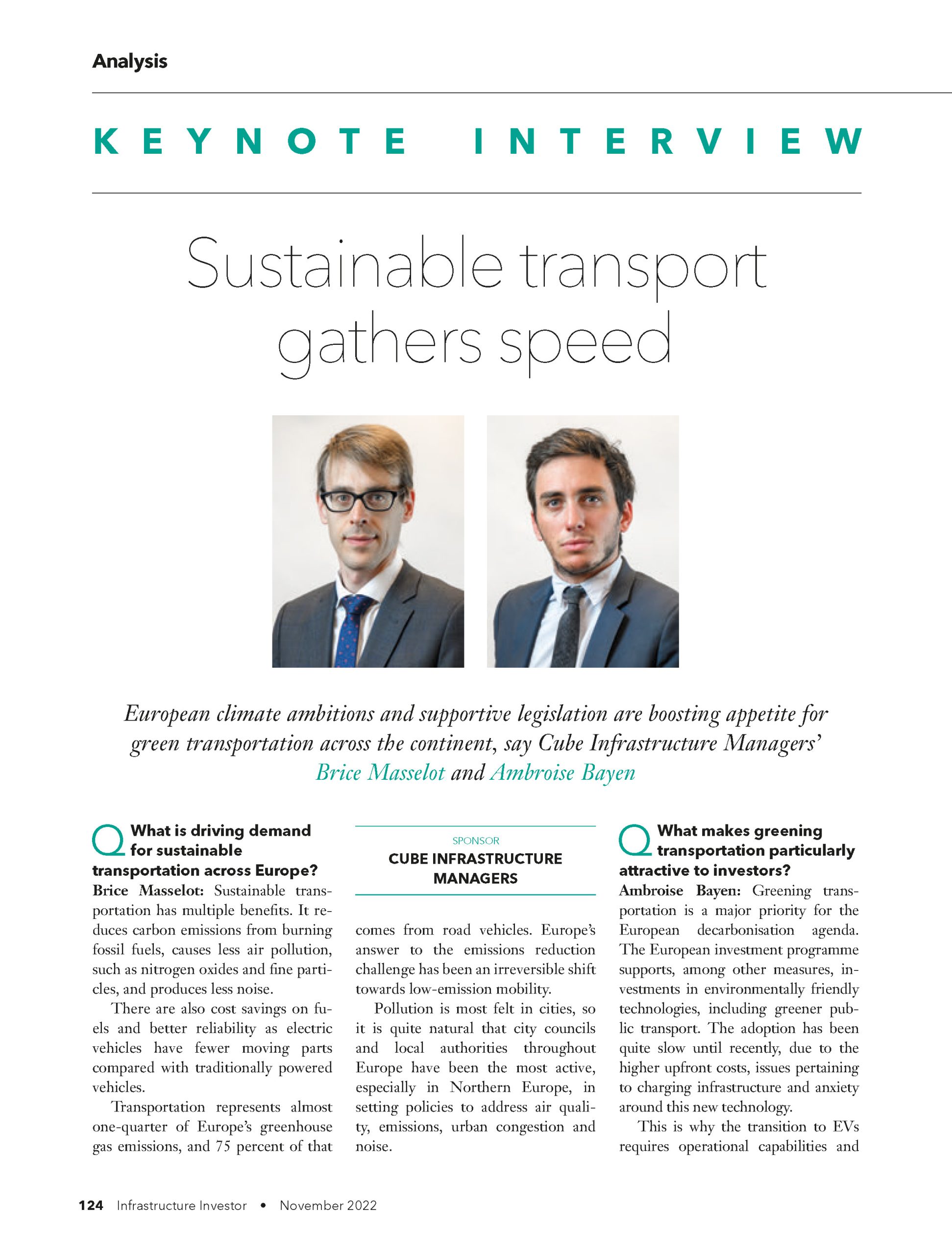European climate ambitions and supportive legislation are boosting appetite for green transportation across the continent, say Cube Infrastructure Managers’ Brice Masselot and Ambroise Bayen
What is driving demand for sustainable transportation across Europe?
Brice Masselot: Sustainable transportation has multiple benefits. It reduces carbon emissions from burning fossil fuels, causes less air pollution, such as nitrogen oxides and fine particles, and produces less noise.
There are also cost savings on fuels and better reliability as electric vehicles have fewer moving parts compared with traditionally powered vehicles.
Transportation represents almost one-quarter of Europe’s greenhouse gas emissions, and 75 percent of that comes from road vehicles. Europe’s answer to the emissions reduction challenge has been an irreversible shift towards low-emission mobility.
Pollution is most felt in cities, so it is quite natural that city councils and local authorities throughout Europe have been the most active, especially in Northern Europe, in setting policies to address air quality, emissions, urban congestion and noise.
What makes greening transportation particularly attractive to investors?
Ambroise Bayen: Greening transportation is a major priority for the European decarbonisation agenda. The European investment programme supports, among other measures, investments in environmentally friendly technologies, including greener public transport. The adoption has been quite slow until recently, due to the higher upfront costs, issues pertaining to charging infrastructure and anxiety around this new technology.
This is why the transition to EVs requires operational capabilities and capital. At Cube, we carefully select our investments by choosing mid-sized public transport operators with contracted regular line activities able to demonstrate significant operational strengths which are essential to contribute to the investment efforts for greening European fleets.
If you compare EVs to traditional diesel vehicles, the former have higher capital requirements. But to fully grasp the economic benefits of more sustainable transport fleets on top of the environmental benefits, what is relevant is the total cost of ownership (TCO) over the lifecycle of the vehicle.
EVs now have lower TCOs than diesel vehicles, because while the capital costs account for a much higher portion of TCO, the operational costs including maintenance and fuel are significantly lower. Technological improvements are expected to reduce the cost of EVs even further in the coming years.
The EU has proposed tougher CO2 emission standards for new cars, and the US recently created new tax incentives for EV manufacturers in the Inflation Reduction Act. How important is regulation in encouraging the shift to greener transport?
BM: It is very important. The EU’s Fit for 55 agenda, which refers to the bloc’s ambition to reduce net greenhouse gas emissions by at least 55 percent by 2030compared to 1990 levels, along with regulation at the local level from city councils and public transport authorities, will all accelerate decarbonisation.
There is clearly desire for change and public transport authorities are increasingly requiring fleets with zero-emission vehicles in the tenders they issue. Dialogue is important here, and we encourage our companies to engage with their public counterparts and ac- tively promote fleet electrification on the backing of the strong references they have built within their portfolios.

ALL ABOARD THE ELECTRIC BUS
Annelise Sommer, CEO of Danish line bus operator Umove, explains the benefits of green public transport
Denmark is one of the most active markets in Europe in terms of electric regular line bus operations, amid an accelerating transition from diesel to zero-emission vehicles. Umove is fully committed to this agenda, being the first bus operator to introduce 20 electric buses in the city of Roskilde in 2019.
Since then, Umove has gradually gained market share by winning more tenders across Denmark for zero-emission bus fleets. In August, Umove was awarded a large part of the Movia A21 public tender for bus operations in the Greater Copenhagen area, which represents the largest tender win in Umove’s history.
When operations start in October 2023, the company will be adding 105 new electric buses to its fleet, bringing the total to c.180. In addition to contributing to the reduction of CO2 emissions, these buses – which can now be proposed at no additional cost to public authorities – offer many other benefits, including lower operating costs on energy and maintenance, more reliable operations, less noise and local pollution and higher satisfaction levels from passengers and bus drivers.
How is the volatile energy situation in Europe affecting appetite for sustainable transport such as EVs?
BM: When it comes to public transport, the transport authorities understand that operators need to be protected against energy price volatility, and their contracts include indexation formulas ensuring that fluctuations in electricity prices are reflected in the revenue.
Regarding passenger cars, we see a strong tailwind for EV charging because of the Fit for 55 legislation, which effectively bans transitional internal combustion engines by 2035. Strong adoption of EVs began in the Nordic countries, but uptake is now gathering pace across Europe.
How does investing in public and green transport help advance the ESG conversation?
BM: Private transportation with individual passenger cars is a very significant emitter of CO2. If you get more people using public transport, there will be fewer cars on the road and it will solve congestion problems. Many cities have recognised this and have created special bus lanes to incentivise public adoption.
EVs are also a good way to reduce CO2 emissions. Electrification has a very clear impact on the emission of pollutants and noise, while drivers prefer electric buses to diesel ones. That is something that we see across our portfolio companies. In Denmark, when we talk with our management teams, they have noticed this shift and report very high satisfaction rates from customers and passengers alike.
It is a theme that resonates a lot with our LP base, too. It is important to an LP committing capital to know that it is being used for good and contributing to progress in society. We are proud of the sectors in which we invest, providing jobs for local communities and with a very strong public component. We work hard to find the best solutions for local authorities.
How do you weigh the impact on local communities when investing in sustainable infrastructure?
AB: Sustainable investment obviously also has a social component, and this is very important for public transportation companies because human capital is central. They employ a very large workforce, which is growing every year.
Given they render a public service, employees and drivers are the people that make it all possible. If there are strikes that might disrupt these public services, it is an issue that can lead to penalties from public transport authorities and cause reputational damage. That is why our companies work hard to develop their positioning as employers of choice and we closely monitor absenteeism rates and accidents, setting KPIs across all of our portfolio companies and clear annual objectives. We then try to compare those KPIs across our portfolio taking into account the specificities of each company. We then compare our companies with their peers in the market. We monitor this on a yearly basis but also discuss it regularly at board meetings to make sure that management is fully committed.
“Europe’s answer to the emissions reduction challenge has been
an irreversible shift towards low-emission mobility”
BRICE MASSELOT
Where are the best opportunities for investors within sustainable transportation?
BM: Over the past five years, we have witnessed an accelerating shift towards zero-emission mobility, particularly in Northern Europe. This shift is being made possible by significant improvements in EV battery technology, both in terms of range and price, which has fallen by around 90 percent over the past decade.
Across our portfolio, we operate more than 3,700 buses today and, out of these, 35 percent are powered with non-fossil energy sources – either electric or run on biogas or hydrogen. If we look only at the Nordics this ratio is 55 percent and this trend is accelerating. In Denmark, 80 percent of new vehicles will be electric for new tenders.
EV charging is an exciting area; we are rolling out networks of rapid charging solutions on public and commercial sites. A 50KW rapid charger gives consumers an 80-100km driving range from a 20-minute charging session, which is enough to cover more than 90 percent of all journeys across Europe and makes EVs a viable decarbonisation solution for passenger cars.
The development of this infrastructure goes hand in hand with the explosive growth that we are observing in EV sales in Europe. EU legislation is only going to boost this trend.
How can managers engage effectively with portfolio companies to deliver sustainable investment?
AB: All asset owners and managers, especially in the infrastructure space, need to clearly demonstrate a serious approach to ESG through the whole investment cycle. At Cube, given that we usually act as controlling shareholder, we have a key role to play in the development of our portfolio companies.
We integrate ESG into our investment cycle, firstly by using external advisers to do due diligence and assess the performance of potential companies. We jointly develop an action plan that is discussed with the management of the company, because we need to make sure that this plan, which is a tiered theoretical plan, is implemented during the investment period. We regularly update the plan and discuss it with the board to make sure that obstacles are overcome; sometimes we even integrate variable compensation for the management team to make sure those ESG plans are implemented.
To give a concrete example of the correlation between the ESG and financial performance of our portfolio companies, in Denmark, bus line operator Umove hired an expert to facilitate the reduction of fuel consumption across its depots through training and campaigns. Each driver is now financially incentivised to reduce their fuel consumption.
Brice Masselot is investment director and Ambroise Bayen is investment manager at Cube Infrastructure Managers
